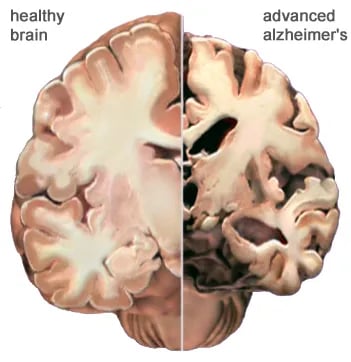Type 3 Diabetes: The Connection to Dementia Explained in 2024
Learn about the shocking connection between Type 3 Diabetes and Dementia in this eye-opening video. Discover the latest research findings and insights into how these two conditions are linked, and what you can do to protect yourself in 2024 and beyond. Stay informed and take control of your health!
BLOG
7/10/20244 min read
Did You Know There is a Possible Link Between Type 3 Diabetes and Dementia?
In 2024, ground breaking research has uncovered a shocking connection between type 3 diabetes and dementia, fundamentally changing our understanding of these conditions. Type 3 diabetes, often referred to as brain diabetes, highlights the significant impact of insulin resistance on the brain and its potential to lead to neurodegenerative disorders, including dementia.
Introduction
The term "type 3 diabetes" has gained attention in recent years as researchers explore its connection to dementia. This concept revolves around the idea that insulin resistance and excessive glucose levels can lead to inflammation and nerve degeneration in the brain. As the brain becomes less able to use glucose effectively due to insulin resistance, this condition can result in cognitive decline and, ultimately, dementia. The relevance of this connection in 2024 cannot be overstated, as it opens new avenues for understanding, preventing, and treating dementia.
Presentation of Problem/Challenge
Individuals with type 3 diabetes face a unique set of challenges, including an increased risk of developing dementia. The brain typically begins to decline around the age of 50 and continues to progress with age. In the case of type 3 diabetes, the brain's inability to use glucose efficiently due to insulin resistance leads to significant damage. This damage includes the degeneration of the myelin sheath, which is crucial for protecting nerve fibres and ensuring efficient communication between neurons. The resulting nerve degeneration and imbalance can cause severe cognitive impairments.
Type 3 diabetes also exacerbates inflammation in the brain, contributing to the deterioration of neural pathways. This combination of factors creates a vicious cycle of declining brain function, manifesting as memory loss, confusion, and other symptoms associated with dementia. As the population ages, understanding these challenges becomes increasingly important to address the growing prevalence of dementia. This book also helped understanding the management of dementia https://amzn.to/3zI86rq
Causes of dementia could be:
mitochondrial dysfunction
genetic factors
environmental toxins
oxidative stress
chronic inflammation
Signs of dementia are the decline of senses, for example:
reduce of smell or taste
peripheral vision
hearing direct sound
touch, sensitive to temperature
However, there are further signs, for example:
posture becoming hunched
shorter steps
asymmetrical
balance causing falls
coordination
unsteady
less expressive face
sloppy handwriting
muscle stiffness
tremors at rest
less stamina
reflexes
confusion
less emotional expression
Taking supplements such as berberine could help reduce these signs: https://amzn.to/3LyBun3
Key Moment
The pivotal moment in 2024 came when researchers identified clear evidence linking type 3 diabetes to dementia. Studies revealed that individuals with type 3 diabetes are at a significantly higher risk of developing Alzheimer's disease and other forms of dementia. Early detection and prevention have emerged as critical strategies in managing this risk. Key findings indicate that insulin resistance in the brain disrupts glucose metabolism, leading to the accumulation of amyloid plaques and tau tangles, which are hallmark features of Alzheimer's disease.
Excess alcohol, refined carbs, refined sugar, artificial sweeteners, bad fats, excess caffeine, food with additives/preservatives affect neurotoxins, liver, DNA causing leaky gut which increases insulin resistance. This book also helped in
Moreover, researchers found that lifestyle modifications, such as a balanced diet, Keto diet, regular exercise, intermittent fasting and effective management of blood glucose levels, can play a vital role in reducing insulin and mitigating the risk of developing dementia. These findings emphasize the importance of addressing insulin resistance and glucose management not only for overall health but also for maintaining cognitive function as we age.
Enjoy this quick and easy keto-friendly avocado egg salad that's perfect for a light lunch or snack!
Ingredients:
2 ripe avocados
4 hard-boiled eggs
2 tablespoons mayonnaise (preferably sugar-free)
1 tablespoon Dijon mustard
1 tablespoon lemon juice
1/4 cup red onion, finely chopped
1/4 cup celery, finely chopped
Salt and pepper to taste
Fresh parsley or chives, for garnish (optional)
Instructions:
Prepare the Eggs:
Peel the hard-boiled eggs and chop them into small pieces. Place them in a medium-sized mixing bowl.
Prepare the Avocados:
Cut the avocados in half, remove the pit, and scoop the flesh into the bowl with the eggs. Use a fork to mash the avocado to your desired consistency.
Mix the Ingredients:
Add the mayonnaise, Dijon mustard, and lemon juice to the bowl. Stir well to combine.
Add the Vegetables:
Mix in the finely chopped red onion and celery. Stir until all ingredients are well incorporated.
Season:
Add salt and pepper to taste. Adjust the seasoning as needed.
Serve:
Garnish with freshly chopped parsley or chives if desired. Serve the avocado egg salad on a bed of lettuce, in lettuce wraps, or enjoy it as is.
Tips:
Storage: This avocado egg salad is best eaten fresh but can be stored in an airtight container in the refrigerator for up to 2 days.
Variations: Add other keto-friendly ingredients like diced bacon, pickles, or a sprinkle of paprika for extra flavour.
Here are some exercises to improve strength and flexibility
Conclusion
The link between type 3 diabetes and dementia uncovered in 2024 represents a significant advancement in our understanding of neurodegenerative diseases. The evidence suggests that insulin resistance and impaired glucose metabolism in the brain are key factors contributing to the development of dementia. Recognizing these connections underscores the importance of early detection, prevention, and lifestyle modifications in reducing the risk of cognitive decline.
As we move forward, healthcare interventions that focus on managing glucose levels and improving insulin sensitivity in the brain will be crucial. By prioritizing a healthy lifestyle and proactive healthcare measures, we can better protect our brain health and reduce the impact of dementia on individuals and society as a whole. The insights gained from this research pave the way for new treatments and strategies to combat dementia, offering hope for a future with improved cognitive health for all.








